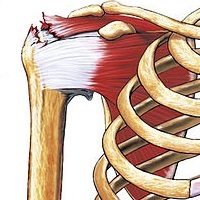
Photo from wikipedia
The first objective of this study was to identify work-related musculoskeletal symptoms and determine their prevalence in the practice of Otolaryngology and Head and Neck surgery in Canada. The second… Click to show full abstract
The first objective of this study was to identify work-related musculoskeletal symptoms and determine their prevalence in the practice of Otolaryngology and Head and Neck surgery in Canada. The second objective was to establish potential associations between those musculoskeletal symptoms and variables related to demographic status of the surgeons, their workload and work ergonomics. This study was designed as a Canadian census on work-related musculoskeletal symptoms amongst Otolaryngologist and Head and Neck surgeons. The census was a self-administered electronic survey. It was distributed to all Otolaryngologists and Head and Neck surgeons members of either the Canadian Society of Otolaryngology-Head and Neck Surgery or the Association of Oto-rhinolaryngology—Head and Neck Surgery of Quebec. The questionnaire contained three sections: demographic and workload-related data, identification of work-related musculoskeletal symptoms and evaluation of working ergonomics. The response rate was 23%. Ninety seven percent (97%) of respondents experienced some physical symptom in one or many regions of their body. Seventy-four percents (74%) of respondents noted an exacerbation of their musculoskeletal symptoms by work. Musculoskeletal symptoms limited the daily activities of 45% of respondents while 23% think that their occupational longevity will be diminished by these limitations. The prevalence of work-related musculoskeletal disorders is high among otolaryngologists and its impact on the surgeon’s personal and professional life is high. There is a need to improve ergonomics in the clinical and operative room settings and to educate surgeons on ergonomic principles.
Journal Title: European Archives of Oto-Rhino-Laryngology
Year Published: 2017
Link to full text (if available)
Share on Social Media: Sign Up to like & get
recommendations!